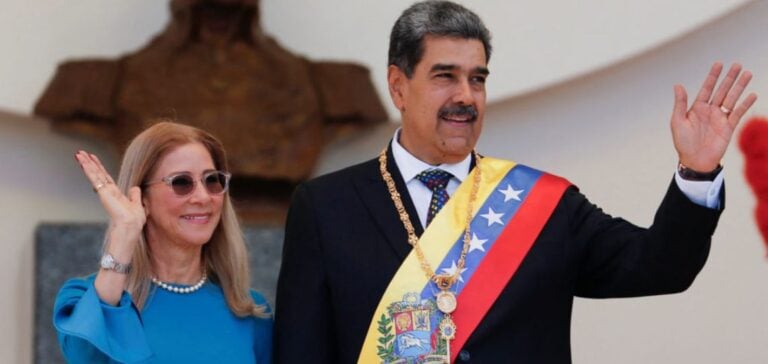Donald Trump’s return to the White House and Nicolás Maduro’s inauguration for a third presidential term symbolize a decisive turning point for US-Venezuela relations. These two controversial figures embody a deep ideological polarization where energy interests and diplomatic tensions intertwine in a battle with stakes that transcend regional borders.
Since 2013, Caracas has been a burning issue in US foreign policy. Between severe sanctions, economic crises, and the pragmatism needed to maintain strategic access to Venezuelan oil, the relationship between the two nations has oscillated between confrontation and interdependence. In 2025, as the Trump administration prepares to tighten sanctions, Venezuela, weakened yet strategic, remains a key player in the global energy landscape.
Maduro: A Term Under International Pressure
On January 10, 2025, Nicolás Maduro began his third presidential term amid widespread contestation. Deemed illegitimate by the US, Canada, the European Union, and the United Kingdom, this inauguration marked a new chapter in a political crisis that has only deepened.
Yet, according to the opposition, Edmundo González Urrutia, who won the July 2024 presidential election with 67% of the vote, should have been inaugurated. However, Maduro took drastic measures to prevent his return: closing airspace and activating national defense systems. This show of force reflects the fragility of his regime, which relies on coercive measures to maintain control.
María Corina Machado, a leading opposition figure, described this situation as a “coup d’état.” Freed after a controversial arrest on January 9, she praised international pressure for her release. “Maduro cannot rule by force over a country that has decided to free itself,” she declared, calling for increased mobilization.
Meanwhile, the US Treasury Department has ramped up sanctions against Maduro’s regime, targeting eight close associates, including Hector Andres Obregon Perez, president of PDVSA. According to S&P Global, these new measures are accompanied by additional restrictions on oil exports, increasing pressure on an already suffocating economy.
Trump: A Return to Maximum Sanctions?
On January 20, 2025, Donald Trump will reclaim the Oval Office. His first term was marked by escalating tensions with Maduro’s regime, notably through the recognition of Juan Guaidó as Venezuela’s legitimate president and the imposition of draconian economic sanctions. His return to power could signal a tougher approach, especially with heightened restrictions on oil exports.
However, before leaving office, the Biden administration maintained specific licenses allowing Chevron and other American companies to continue operating in Venezuela. This measure, though controversial, aims to secure a limited yet strategic flow of Venezuelan oil to the US. During a January 10 press conference, a senior Biden administration official stated: “Depending on developments over the next ten days, we are ready to make recommendations to the incoming administration regarding the future of these licenses.”
This posture illustrates the complexity of the decisions ahead for Trump. While the US seeks to maximize pressure on Maduro, domestic economic interests, including reliance on heavy Venezuelan crude for American refineries, will temper any extreme measures.
Economic and Strategic Stakes
**The Crucial Role of Oil**
With the world’s largest proven oil reserves, Venezuela remains a key player despite the collapse of its oil industry. US sanctions have crippled PDVSA, limiting its production capacity and restricting the country’s access to foreign currency.
Yet mutual dependency persists. American refineries, adapted to process Venezuelan heavy crude, play a crucial role in US energy policy. This interdependence forces Washington to balance strict sanctions with the pragmatism needed to avoid disruptions in global oil markets.
At the same time, the US State Department has intensified efforts to isolate Maduro’s regime. Rewards for information leading to the arrest of Maduro and his allies have been raised to $25 million, sending a strong message aimed at further weakening his power.
Corruption scandals, particularly within PDVSA, continue to undermine investor confidence. In 2024, revelations of massive embezzlement amplified international partners’ mistrust. Structural reforms and increased transparency will be essential for any hope of economic recovery.
Toward a Diplomatic Standoff
Trump’s return and Maduro’s consolidation of power lay the groundwork for a major diplomatic confrontation. If Trump opts for tougher sanctions, Maduro may deepen alliances with players like China and Russia, who already play a crucial role in sustaining his regime.
This dynamic could redefine power balances in Latin America, as Washington seeks to contain Caracas’ influence while preserving its strategic energy interests.
An Uncertain Future for Bilateral Relations
The year 2025 promises to be a pivotal moment for US-Venezuela relations. The decisions made by these two leaders, as polarizing as they are unpredictable, will have major repercussions on regional geopolitics and global energy markets.
Beyond the tensions, oil remains the backbone of this ambivalent relationship. While Trump may intensify pressure, the mutual dependency between the two countries could temper extreme actions and maintain a fragile balance between economic pragmatism and ideological confrontation.






















